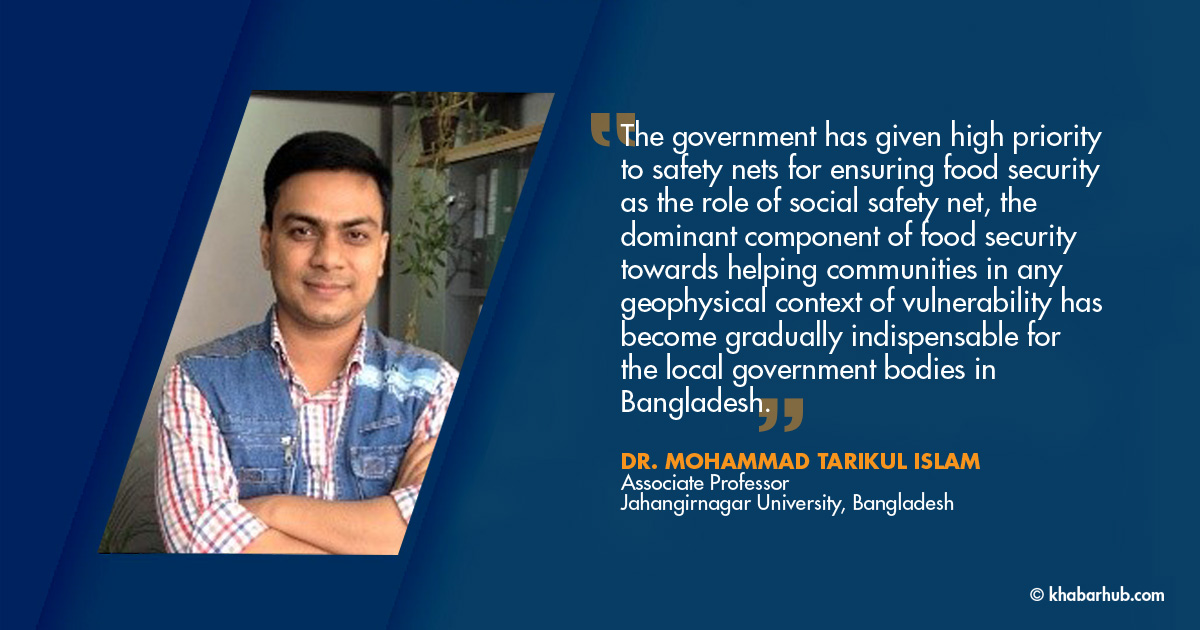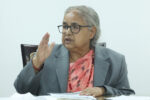Access to food or food security is observed as one of the essential rights of the citizens which are specified in the constitution of Bangladesh. Food security exists when all people, at all times, have access to sufficient, safe, and nutritious food which ultimately leads to vigorous and industrious lives.
Farming is a significant occupation in Bangladesh, all the more explicitly, around 70 percent of the general population of Bangladesh live in rural territories where horticulture assumes a fundamental job to quicken the country’s economy.
Very nearly 60 percent of the rural family units are occupied with cultivating. The cultivating family unit can get to their food from self-generation or potentially exchanging the surplus with different foods accessible in the nearby market.
However, the land ownership is inconsistently appropriated, as is simply the entrance to sustenance creation. To support the food security of the extremely needy people, several social protection programs such as vulnerable group feeding, allowance for destitute women, and old-age pensions have also been introduced where the local government has a certain role to play.
Food security is one of the apparatuses to keep individuals from falling into the profundity of destitution, hopelessness, helplessness, and fiasco and help that person amid developments in provincial territory.
Bangladesh is exposed to disaster vulnerability and natural calamities such as floods, droughts and cyclones have been very typical in Bangladesh.
Riverine Bangladesh also witnesses frequent land erosion causing thousands of people to lose their land every year.
Despite the gains achieved by Bangladesh in increasing the availability of staple food, a safety net program is essential to insulate the poverty-stricken population from chronic as well as temporary food insecurity that results from external shocks.
Currently, many food-safety net programs are in operation in Bangladesh which has its specific objectives and target population particularly.
These include test relief, Vulnerable Group Feeding, Vulnerable Group Development, Food for Work, Employment Guarantee Scheme, etc.
The present government has given high priority to the safety nets for ensuring food security. The evaluation of the programs, however, revealed several limitations; a) large overheads due to the operation of a large number of small programs by different ministries often with the same objectives, b) improper targeting of beneficiary households, and c) leakages in implementation.
The employment guarantee program during the slack seasons is the only exception, which appears to be self-targeted as the beneficiary has to provide manual labor.
However, the level of consumption of other food items hardly meets the requirement for a balanced diet as specified by the National Nutrition Council and FAO.
The on-going climatic occasion has made the rainstorm progressively inconsistent, bringing dangers up in sustenance generation.
With the imbalanced utilization of manures and the overexploitation of soil supplements, the dirt fruitfulness has been declining slowly.
Furthermore, the groundwater aquifer has been going down from over-digging for flooding boro rice. The low draping organic products concerning water system development and innovative advancement have just been collected.
Because of every one of these components, the potential for further increment underway is getting restricted.
Individuals living in the village are pretty much influenced by certain possibilities like joblessness, business damage, disorder, inability, widowhood, maturity, passing of the chief bread worker of the family, catastrophic event also.
Such issues are extremely mind-boggling and it is hard to adapt to issues just by deliberate and philanthropic estimations of the general population. In this manner, they couldn’t leave the heritage of helplessness and demonstrated their hesitance towards political support.
In order to overcome such challenges, food security is indispensable to cope with any mishap that may befall them at any time in rural Bangladesh.
The greater part of the Union Parishad made it for authority reason, however, for all intents and purposes, their suggestion isn’t seen anyplace.
A natural disaster has been a common phenomenon and affects the whole society. A natural disaster like flood, cyclone, and famine causes many lives and creates poverty, want, unemployment, disease, etc. Besides, to generate full-time employment opportunities for people in rural Bangladesh, the agricultural sector is not sufficient enough.
Food security is one of the apparatuses to keep individuals from falling into the profundity of destitution, hopelessness, helplessness, and fiasco and help that person amid developments in provincial territory.
The objective of food security is to give the least monetary, physical, and social guide to people who have no different methods for supporting themselves.
Thus, food security is in truth a significant vital part of individuals living in our country Bangladesh and triggers political cooperation of this specific area in the general public.
The role of the social safety net (SSN), a dominant component of food security towards helping communities in any geophysical context of vulnerability is becoming increasingly important.
To enhance allocation to maintain a healthy social safety net, efforts must be made significantly. However, new modalities will have to be pursued and developed so that vulnerable women can directly receive the benefits from SSN practices.
The current barriers concerning rather illusionary access to SSN for women, especially for women-headed households, should be eliminated with proper planning and implementation of programs.
To complement State-run programs, the donor and NGO communities must devise matching plans and programs, taking special care of the above-mentioned issues. Gender caucus may be developed and nurtured to facilitate inter-agency coordination and monitoring.
The elements of standing committees in Union Parishad are vital, significant and huge to improve the administration conveyance at the grassroots level.
Fundamentally Union Parishad is an administration conveyance association, however, its proficiency and limit are as yet far from being obviously true.
A progressively productive open food grain dissemination framework can make a critical commitment to the food security of defenseless families who need intends to get to the food.
For straightforward and responsible and reasonable administration conveyance organ of the nearby government, Union Parishad should make its standing committee practical. Be that as it may, the situation of Union Parishad isn’t in all respects amicable on the subject of the viability of standing panels.
The greater part of the Union Parishad made it for authority reason, however, for all intents and purposes, their suggestion isn’t seen anyplace.
According to the designation of business, individuals from the Standing Committee on Agriculture enact agrarian officials to get the ordinary status of the rural program, to help the minor ranchers for better creation of yields.
The individuals from the standing committee likewise screen consistently extraordinary standing yields. Yet, in truth, the effectiveness of the standing committee is still on paper.
To render food security to the provincial individuals in Bangladesh, Union Parishad is a standout amongst the most significant units of the focal government.
Any projects of Union Parishad are a huge supporter of social help and social administrations of the neighborhood individuals living in the provincial territory.
Union Parishad has a noteworthy obligation to adapt to neighborhood possibilities like a catastrophic event, destitution, seniority, widowhood, vulnerabilities, affliction, joblessness, business damage, inabilities and so forth by giving different guide likes social help and social administrations.
Additional pro-food security programs should be incorporated with the existing function responsibilities of Union Parishad.
Cooperation between NGOs and UP is a must in this respect. To provide social assistance and social services to vulnerable groups in rural areas, NGOs play an effective role in Bangladesh.
NGOs are very operational in this regard. NGOs and UP can jointly should the responsibilities for the deliberation of food security program for the rural people.
Concerning political support of the defenseless gathering in rural Bangladesh, it is obvious that Union Parishad is one of the noteworthy units for the advancement of majority rule government.
Union Parishad is the devoted body of the national government in the execution of a social safety net program for the helpless gathering. It is ordered to guarantee food security of the country’s poor and helpless area.
Time has come to realize the importance of food security for the social and economic benefits of the rural people especially those who are disabled, unemployed, poor, sick, old-age, widow, divorced, and vulnerable.
Bangladesh still can’t seem to accomplish far-reaching food security that resolves the issues of insufficient sustenance consumption and incessant lack of healthy sustenance among needy individuals.
Tackling these issues will require deliberate activity by the government, the private sector and individual families. Consistent endeavors should be made in creating and dispersion of improved harvest assortments and regular assets on the board to produce a sufficient supply of food to address the issues of the developing populace.
A progressively productive open food grain dissemination framework can make a critical commitment to the food security of defenseless families who need intends to get to the food.
Suitably focused on pay moves, credit projects and protection components in the midst of emergency particularly COVID-19 pandemic may create high adjustments in lessening destitution and improving food security.
These interventions should be part of a broader social protection strategy that is both cost-effective and comprehensive in coverage.
After China and India, Bangladesh holds the third-largest hungry population, with over 60 million people having inadequate food resources, leading to growth stunting and reduced mental and physical capacities.
While Bangladesh is nearly self-sufficient in rice production, food security remains an elusive goal. However, a large part of the population still lacks access to sufficient, safe and nutritious food.
Ensuring that everyone has food security is, therefore, a high priority for the Government of Bangladesh led by Prime Minister Sheikh Hasina.
A partnership has to be developed between government, social organizations, and local government. There should be a political will to implement social welfare programs aimed at protecting the vulnerable groups of society.
Social audits by independent organizations, including beneficiary organizations, will reduce the misuse of social welfare programs.
Acknowledging the vital role of local government in the protection of food security will enable us to mobilize local stakeholders and to create new partnerships, based on a common understanding of our shared humanity.
The obstacles which jeopardize the very functioning of local government should be addressed properly. Initiating employment programs will pave the way for more opportunities for them to create a stronger future.
We must remember that a critical challenge encountered in the early implementation of the MDGs as opposed to the SDGs was the initial lack of grassroots consultation and support and, most importantly, community ownership.
Local government must have the means and the capacity to improve administration, anticipate demands, plan and implement solutions.
To upscale efforts, we need greater cooperation and national and international coordination mechanisms, as well as enough resources to attain food security in the rural areas of Bangladesh.
Time has come to realize the importance of food security for the social and economic benefits of the rural people especially those who are disabled, unemployed, poor, sick, old-age, widow, divorced, and vulnerable.
The obstacles which jeopardize the very functioning of local government should be addressed properly. Initiating employment programs will pave the way for more opportunities for them to create a stronger future.
Last but not least, “effective, accountable and transparent institutions” and “responsive, inclusive, participatory and representative decision-making at all levels” require a clear institutional framework, reinforced management and planning capacities, participatory mechanisms and regular financial negotiations between all levels of government and local communities to define priorities and plan of action for ensuring food security of the rural dwellers in Bangladesh.
(Dr. Mohammad Tarikul Islam is an Associate Professor of the Department of Government and Politics at Jahangirnagar University in Bangladesh. He is the Visiting Scholar of Oxford and Cambridge. Prior to joining the university, Dr. Islam was serving the United Nations for seven years. As a popular development columnist in South Asia, Professor Islam writes for the LSE South Asia Blog, Cambridge Global Human Movement Blog, Oxford Department of International Development Blog, the Khabarhub, the Daily Star, the Daily Independent, the Financial Express, The Business Time, the Daily Jugantor and the South Asia Monitor regularly)









Comment